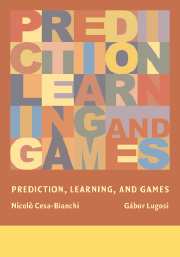Book contents
- Frontmatter
- Contents
- Preface
- 1 Introduction
- 2 Prediction with Expert Advice
- 3 Tight Bounds for Specific Losses
- 4 Randomized Prediction
- 5 Efficient Forecasters for Large Classes of Experts
- 6 Prediction with Limited Feedback
- 7 Prediction and Playing Games
- 8 Absolute Loss
- 9 Logarithmic Loss
- 10 Sequential Investment
- 11 Linear Pattern Recognition
- 12 Linear Classification
- Appendix
- References
- Author Index
- Subject Index
7 - Prediction and Playing Games
Published online by Cambridge University Press: 03 December 2009
- Frontmatter
- Contents
- Preface
- 1 Introduction
- 2 Prediction with Expert Advice
- 3 Tight Bounds for Specific Losses
- 4 Randomized Prediction
- 5 Efficient Forecasters for Large Classes of Experts
- 6 Prediction with Limited Feedback
- 7 Prediction and Playing Games
- 8 Absolute Loss
- 9 Logarithmic Loss
- 10 Sequential Investment
- 11 Linear Pattern Recognition
- 12 Linear Classification
- Appendix
- References
- Author Index
- Subject Index
Summary
Games and Equilibria
The prediction problems studied in previous chapters have been often represented as repeated games between a forecaster and the environment. Our use of a game-theoretic formalism is not accidental: there exists an intimate connection between sequential prediction and some fundamental problems belonging to the theory of learning in games. We devote this chapter to the exploration of some of these connections.
Rather than giving an exhaustive account of the area of learning in games, we only focus on “regret-based” learning procedures (i.e., situations in which the players of the game base their strategies only on regrets they have suffered in the past) and our fundamental concern is whether such procedures lead to equilibria. We also limit our attention to finite strategic or normal form games.
In this introductory section we present the basic definitions of the games we consider describe some notions of equilibria, and introduce the model of playing repeated games that we investigate in the subsequent sections of this chapter.
K-Person Normal Form Games
A (finite) K-person game given in its strategic (or normal) form is defined as follows. Player k(k = 1, …, K) has Nk possible actions (or pure strategies) to choose from, where Nk is a positive integer.
- Type
- Chapter
- Information
- Prediction, Learning, and Games , pp. 180 - 232Publisher: Cambridge University PressPrint publication year: 2006

